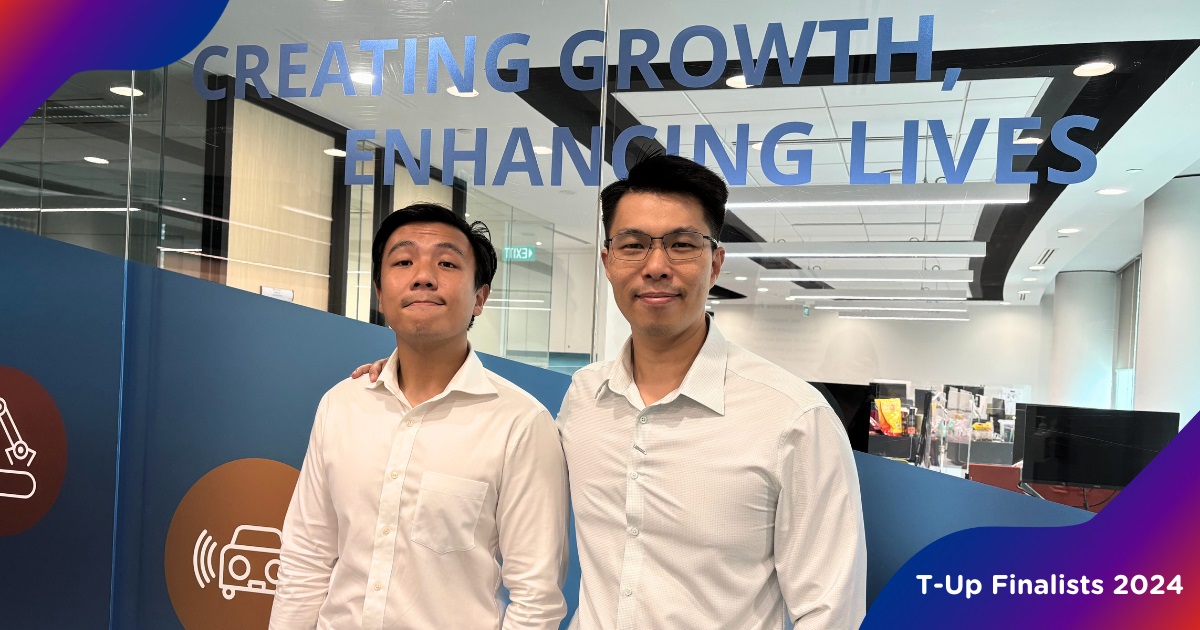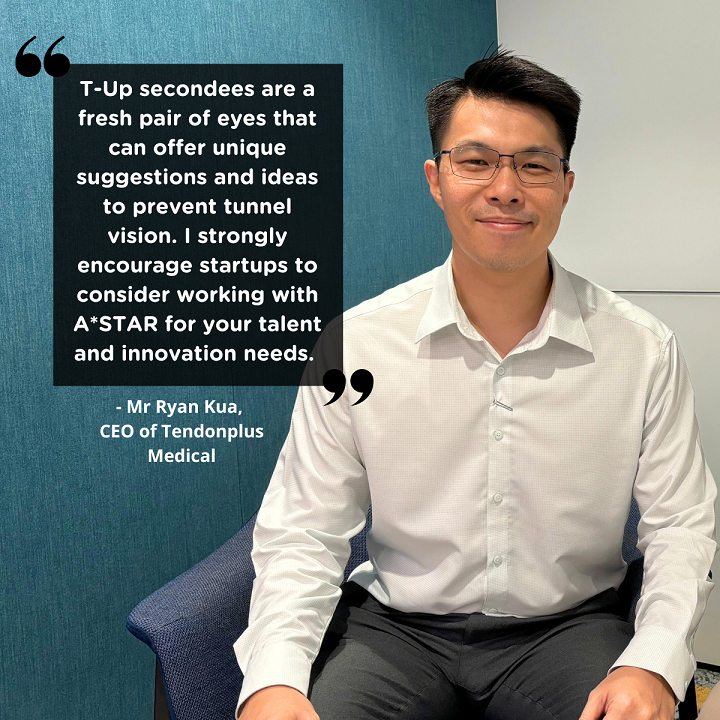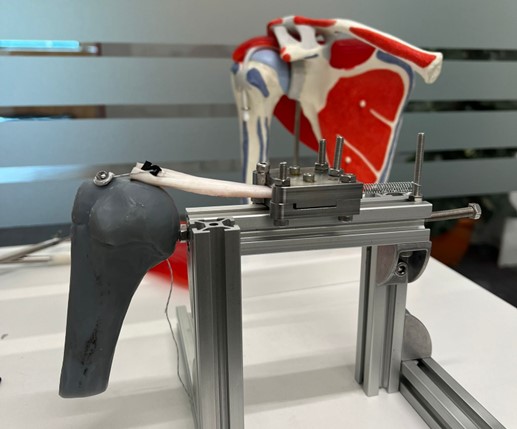Contributing to better health outcomes for Singapore
23 August 2024

Wu Zi An (left), senior research engineer at A*STARs SIMTech and T-Up Secondee, with Mr. Ryan Kua (right), CEO of Tendonplus Medical
Tendonplus Medical develops advanced therapies to repair and regenerate damaged tendons. Their innovative solution aims to improve healing and restore function in patients with rotator cuff or tendon injuries.
Rotator cuff injuries are becoming increasingly common in Singapore. The prevalence of rotator cuff tears in Singapore is approximately 1%, with the average age of onset being 40 years.1 .
Rotator cuff (shoulder joint) repair involves attaching surgical sutures to the tendon and tying it to the upper arm. Surgical sutures, also called stitches or sutures, are a medical device used to hold body tissues together after an injury or surgery. Despite rotator cuff repair, patients often experience re-tearing of the tendon.
One of the main causes of failure is that the suture cuts through the tendon when pulled. The re-tear rate is estimated to be about 20% in patients who have undergone rotator cuff repair.
To address this unmet clinical need, Tendonplus Medical has developed its novel TendonPlus Shoulder Eyelet implant and applicator, which protects the tendon from suture, preventing tendon re-tearing following rotator cuff repair. An important advantage of this implant is that it can be deployed in a minimally invasive manner, which can reduce the risk of infection and shorten recovery time.
Quick questions for Mr. Ryan Kua, CEO of Tendonplus Medical

Q: What was the biggest challenge your company faced and how did A*STAR’s Technology for Enterprise Capability Upgrading (T-Up) program help you overcome it?
A: We had to explore ideas and improve the design iteration process. It was challenging to develop something new without testing the prototype and the feasibility of its design.
As part of the T-Up project, our delegate Wu Zi An from A*STAR’s Singapore Institute of Manufacturing Technology (SIMTech) was able to provide insights from a mechanical engineering perspective, another expertise that complemented our internal competencies. Zi An helped improve the testing function of the prototype, refine the implant and explore the use of different types of materials.
I would say Zi An was independent, resourceful, innovative and knew how to achieve goals by simplifying the process. He either 3D printed the prototype or used items already in the office to stress test it. Zi An also helped with cadaver testing and designed a fixture to attach the arm for testing the prototype. Overall, Zi An has contributed significantly to improving the existing design of our next generation implant and applicator to reduce the re-tear rate.

Own test device for mobility tests
Q: How did the T-Up seconded employee (Zi An) directly contribute to your company’s sales/product growth?
A: Since our product is not yet on the market, it has not had a direct impact on sales yet, but I would say that Zi An has helped significantly in simplifying the design iteration process, which certainly helps in reducing time to market. As a startup, it is crucial for us to validate products faster.
Currently, the total rotator cuff repair market is valued at approximately $1.2 billion, with failed repairs costing the healthcare system $400 million annually. We estimate that the TendonPlus implant can be used in 70% of all rotator cuff repairs, establishing a new market segment for rotator cuff repairs. After receiving regulatory approvals in the US, we plan to expand beyond Singapore into other major markets such as China, EU, ASEAN, Japan and Korea based on the same market study data.
Q: Could you imagine working with A*STAR again as part of the T-Up program?
A: Yes! We would like to expand and will certainly consider working with A*STAR again to develop a second generation implant.
Q: What would you say to other local startups in Singapore looking for innovation and talent?
A: There are many different aspects of product development in startups, especially hardware. You need an engineer and a mechanical engineer, and if the product is for patients, you may even need biomedical expertise.
A*STAR’s T-Up program can bridge the gap in talent and expertise required for specific projects. Sometimes, as startups, we are still figuring things out. Having a T-Up engineer on hand is a fresh perspective that can provide unique suggestions and ideas to avoid tunnel vision. It feels very refreshing and I highly recommend startups to consider working with A*STAR when it comes to talent and innovation.
1 Source: Pinnacle Orthopedic Group
